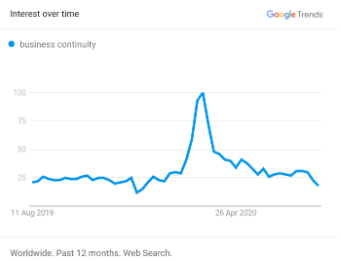BCMS Part 1: Business Continuity Management is crucial for any type of hazard

In Japan where I used to work, a Business Continuity Management System (BCMS) is a common business function. Due to its geographical setting, Japan has repeatedly been impacted by natural disasters. Therefore, companies have for a long time developed contingency plans, thus it was not a giant challenge to adopt BCMS when its concept was introduced following the September 11 attacks (2001, USA).
On the other hand, Belgium is a country that has not been exposed to natural disasters. I believe therefore that a contingency management system has historically not been a priority in Belgium. Even today, from what I can observe, companies that have a developed BCMS have obvious reasons to do so such as regulatory or global group requirements.
Is it true that BCMS is not relevant for Belgian companies?
The goal of BCMS is primarily to continue key business activities in any situation including a crisis regardless the nature of the hazard causing the crisis (all-hazard approach). If you are already familiar with BCMS, you may think that we need to assume specific scenarios to develop Business Continuity Plans (BCP). That is true. Moreover, a detailed scenario is key for a successful BCP. However, these scenarios are only benchmarks or guides to help develop comprehensive plans.
Well-developed BCMS improve resilience of the organization towards all unfavorable events, through key activities such as prioritizing business activities and clarifying the decision-making processes. It should be adaptable beyond the benchmark scenarios because you can never assume what will happen in in reality. In this uncertain world, Belgian companies should not be excluded from these benefits. Furthermore, non-traditional risks such as IT related risks or new social risks have already threatened Belgian businesses.
As with other crises, the current COVID-19 crisis ironically reminds us the importance of BCMS. In fact, we noticed a huge spike in google searches for the word BCMS when people realized the impact of this crisis. Whilst the stakeholders are still aware of the importance, why not develop the BCMS?

By the way, leading companies are accelerating their third party (vendor) management programs. BCMS is one of the key components of their investigations and requirements. If your company is a part of any supply chain, you must tackle it sooner rather than later.
If you need help with this process, please contact us.
Reference
ISO 22301:2019(en) Security and resilience — Business continuity management systems. (as of 16 Apr 2020, some ISO (International Organization for Standardization) standards including ISO 22301:2019 are freely accessible to support global efforts in dealing with the COVID-19 crisis)

